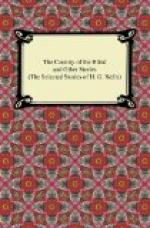He saw now clearly that the sole crew of the vessel was these two dead men, and though he could not see their faces, he saw by their outstretched hands, which were all of ragged flesh, that they had been subjected to some strange exceptional process of decay. For a moment his attention concentrated on those two enigmatical bundles of dirty clothes and laxly flung limbs, and then his eyes went forward to discover the open hold piled high with trunks and cases, and aft, to where the little cabin gaped inexplicably empty. Then he became aware that the planks of the middle decking were dotted with moving black specks.
His attention was riveted by these specks. They were all walking in directions radiating from the fallen man in a manner—the image came unsought to his mind—like the crowd dispersing from a bull-fight.
He became aware of Gerilleau beside him. “Capo,” he said, “have you your glasses? Can you focus as closely as those planks there?”
Gerilleau made an effort, grunted, and handed him the glasses.
There followed a moment of scrutiny. “It’s ants,” said the Englishman, and handed the focused field-glass back to Gerilleau.
His impression of them was of a crowd of large black ants, very like ordinary ants except for their size, and for the fact that some of the larger of them bore a sort of clothing of grey. But at the time his inspection was too brief for particulars. The head of Lieutenant da Cunha appeared over the side of the cuberta, and a brief colloquy ensued.
“You must go aboard,” said Gerilleau.
The lieutenant objected that the boat was full of ants.
“You have your boots,” said Gerilleau.
The lieutenant changed the subject. “How did these en die?” he asked.
Captain Gerilleau embarked upon speculations that Holroyd could not follow, and the two men disputed with a certain increasing vehemence. Holroyd took up the field-glass and resumed his scrutiny, first of the ants and then of the dead man amidships.
He has described these ants to me very particularly.
He says they were as large as any ants he has ever seen, black and moving with a steady deliberation very different from the mechanical fussiness of the common ant. About one in twenty was much larger than its fellows, and with an exceptionally large head. These reminded him at once of the master workers who are said to rule over the leaf-cutter ants; like them they seemed to be directing and co-ordinating the general movements. They tilted their bodies back in a manner altogether singular as if they made some use of the fore feet. And he had a curious fancy that he was too far off to verify, that most of these ants of both kinds were wearing accoutrements, had things strapped about their bodies by bright white bands like white metal threads...
He put down the glasses abruptly, realising that the question of discipline between the captain and his subordinate had become acute.




